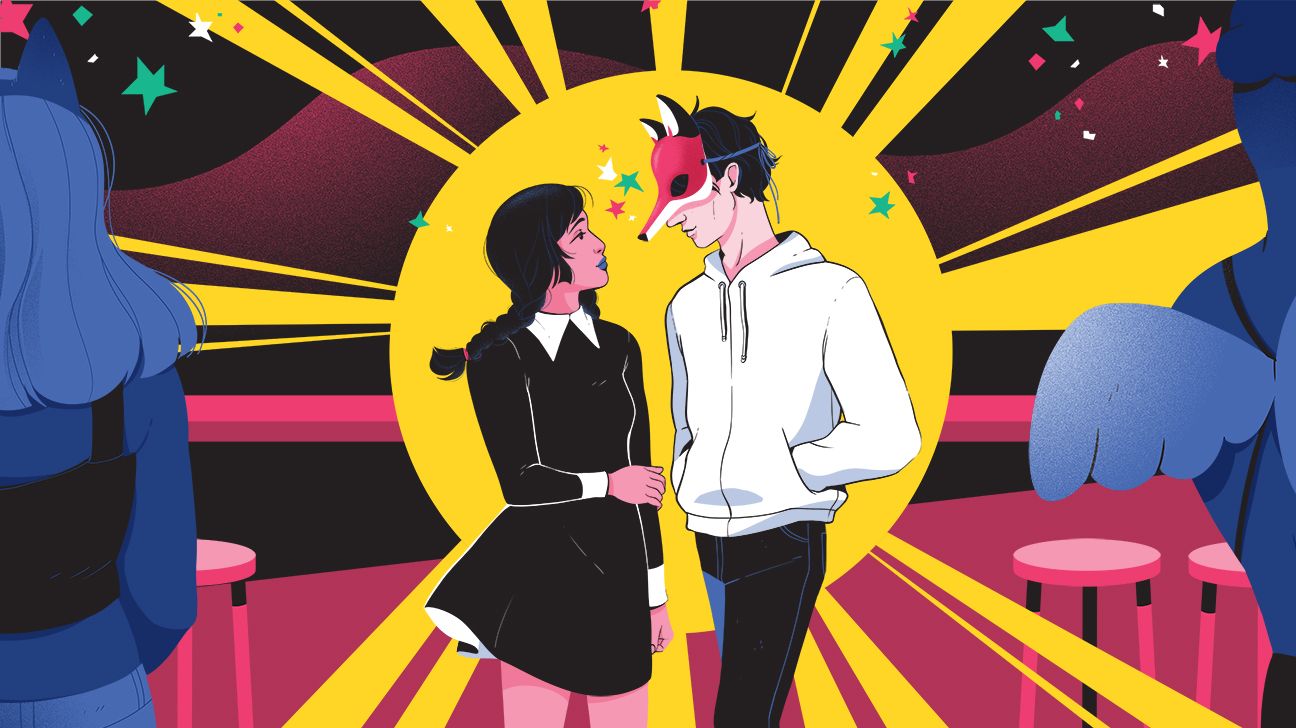
Halloween night 2014 started out as an adventure and ended in magic. First a man dropped $40 of White Castle burgers into my arms, and then I spent most of my time running away from men who were asking if I was an Asian schoolgirl (I was Wednesday Addams).
My friends and I hopped around before settling in a tiki bar, where my friends were, individually, pulled away by a Marine and then a Santa Claus.
I spotted a lone man with a mask (fox or Victorian, I can’t recall), smoking, and decided to ask him for a light.
As we stared at the empty dance floor, I learned he was just figuring out life in New Orleans, working odd jobs, floating around. He used to surf, and he had ice-blue eyes, the kind that had no right to reflect so much light in a room that dark. And I remember looking at the glowing stub between my fingers, when he, after a lull in the conversation, kissed my cheek.
Then I had to go.
When I got in the taxi with my friends, he ran out and perched his arm against the rolled-down window, telling the driver, “Take care of her.”
I barely remember who that girl was or what she said that night, but… that kiss. Thinking of it brings a warm and fuzzy feeling that leaves me convinced: Happily-ever-afters do exist.
But that moment was perfect because it ended, and because it was 6 years ago, when my biggest fear was rooted in feeling unwanted because I thought I was unattractive. Hah.
Fortunately, times change and so do people. What makes me vulnerable now is less the way I look or the things I like. It’s what I feel, for the people I love and about the people I love.
And this new realization has puts a lot of past friendship stressors into perspective.
Last October, I had a panic attack at the thought of talking to a friend of 22 years — 22 years! That time alone is an achievement. And yet there I was, crying breathlessly in bed, scared to my bones, without any clue as to why.
Now I know. The stress was there because he made me feel emotionally unsafe. I grew scared of being myself around him. He’d argue with me about mental health and body size and then end the conversation with praise about how I have a “can talk to you about anything” personality.
For the longest time that backhanded compliment kept me going. I’d sincerely believed, then, that good friendships were about meeting in the middle. The unconditional harmony of give and take.
They’re not.
Meaningful relationships are built on the acceptance of vulnerability.
Because we can make new friends when we choose to. We can end relationships whenever we want to. We can decide, no matter how uncertain the future seems, who deserves our love, as we please.
But none of that power matters if we don’t let people take care of us when we cannot take care of ourselves.
Philosopher T.M. Scanlon once said, “Hell is the relationship with other people that you create by treating them badly […] where you’ve spoiled your relations with the other people you’re living with, and you can’t be friends or trust each other…”
Hell, in other words, is loneliness.
Thankfully, that also means there’s another side.
If we create an antidote to Scanlon’s hell, we get this: The opposite of hell is a place where you’ve built relationships with people you treat well, who treat you well in return, and you trust them.
But to do that, you need to get in touch with your vulnerabilities. It’s a scary task, and you’ll have to be brave. More than once: brave enough to do some introspective work and brave show someone what you found, so you can witness how — even after they see your gnarly, empty, messy, or even delicate bits — they’ll decide to stay.
Well, that’s the peak of it. There’s really no single way to be vulnerable. Each situation and depth of relationship will require a different type of exposure, which is why this month at Greatist, we’re exploring all places expressing these fears, small or big, can appear.
It might start with having the courage to talk to strangers. It could be life-changing, like openly identifying as someone society deems impermissible. It could even feel “inconsequential”, like explaining why you’re too shy to 69.
Regardless of the situation, I’ve learned the true common denominator, in all of the ways, is this: expressing feelings, not for results, but for the sake of expressing them.
Christal Yuen is a senior editor at Greatist. She hasn’t smoked since 2014 and has since found more suitable coping mechanisms for stress. Find her musings about therapy on Twitter.
